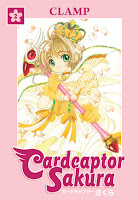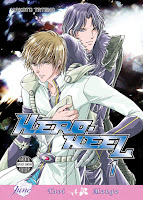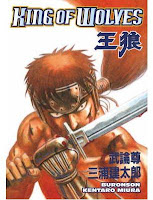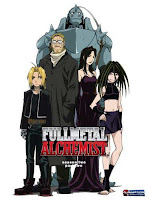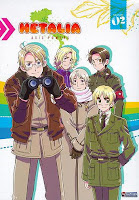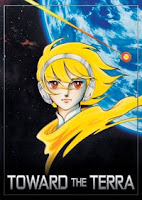My News and Reviews
I posted two reviews here at Experiments in Manga last week. The honor of the first in-depth manga review for December goes to Yoshikazu Yasuhiko’s Mobile Suit Gundam: The Origin, Volume 3: Ramba Ral. The fourth volume in the series is scheduled to be released this month, so I wanted to make sure to catch up with my reviews. Though I wouldn’t call myself a Gundam fan, I’m still really enjoying The Origin manga. The second review was for Ivan Morris’ The Nobility of Failure: Tragic Heroes in the History of Japan. Originally published in 1975, the work was recently brought back into print by Kurodahan Press. It’s an extremely illuminating and fascinating volume. I also announced the Fairy Tail Feast Winner last week. In case you’re looking for some epic manga to read, the post also includes a list of series that have had at least thirty volumes published in English.
I’ve come across quite a few manga-related things online recently. Sadly, that includes the news that PictureBox will no longer be releasing any new titles. PictureBox had some fantastic manga releases this year, including the start of the Ten-Cent Manga and Masters of Alternative Manga series. It also released The Passion of Gengoroh Tagame. PictureBox’s closing means that the previously announced anthology Massive: Gay Erotic Manga And The Men Who Make It, originally scheduled for release in 2014, is now in limbo.
In happier news, Manga Bookshelf’s Melinda Beasi was interviewed at Diamond Bookshelf—Understanding Manga: Editor Melinda Beasi Discusses CBLDF Presents Manga. I thought that Manga: Introduction, Challenges, and Best Practices was a great resource when I read it, so it was interesting to hear about some of the behind-the-scenes work that went into it.
And speaking of interesting interviews, Organization Anti-Social Geniuses has been Talkin’ Seven Seas and Manga Business With Conner Crooks. Crooks is the Social Media Manager at Seven Seas, which has been having a very good year. Part 1 and Part 2 of the interview series are currently available. Part 3 should be posted on Tuesday.
Continuing on with the Seven Seas theme, Sean Gaffney took a look at the publisher’s recently announced licenses over at A Case Suitable for Treatment. And if you’re interested in all of the anime, manga, artbook, and light novels that were licensed in 2013 (as well as related successful crowdfunding projects), Reverse Thieves has you covered with All the Titles Fit to License, 2013 Edition.
Quick Takes
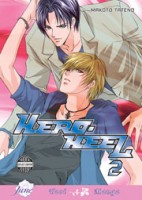 Hero Heel, Volumes 2-3 by Makoto Tateno. Out of the boys’ love manga by Tateno that I have so far read, I think that Hero Heel is probably one of her better works. At least it has some of the most interesting and believable character development. Although that being said, I’m not sure that I’m entirely convinced by the ending, but that might just be because I feel bad for Katagiri. Minami in particular goes through a lot of change as the series progresses. In the first volume he’s almost the villain of the story, blackmailing and forcing his feelings on Sawada. By the end of Hero Heel he’s a much more sympathetic character and has matured significantly. As for Sawada, he comes across as rather harsh from the start, though how much of an asshole he really is isn’t revealed until later. The themes of hero and villain and what it means to be a good person are very prominent in Hero Heel. It’s interesting to see the parallels between the characters that Minami and Sawada play on the superhero show they costar in and their lives off the set.
Hero Heel, Volumes 2-3 by Makoto Tateno. Out of the boys’ love manga by Tateno that I have so far read, I think that Hero Heel is probably one of her better works. At least it has some of the most interesting and believable character development. Although that being said, I’m not sure that I’m entirely convinced by the ending, but that might just be because I feel bad for Katagiri. Minami in particular goes through a lot of change as the series progresses. In the first volume he’s almost the villain of the story, blackmailing and forcing his feelings on Sawada. By the end of Hero Heel he’s a much more sympathetic character and has matured significantly. As for Sawada, he comes across as rather harsh from the start, though how much of an asshole he really is isn’t revealed until later. The themes of hero and villain and what it means to be a good person are very prominent in Hero Heel. It’s interesting to see the parallels between the characters that Minami and Sawada play on the superhero show they costar in and their lives off the set.
 Pretty Guardian Sailor Moon: Short Stories, Volume 2 by Naoko Takeuchi. For the most part, I think I probably enjoyed the second (and final) volume of Sailor Moon short stories more than I did the first. In general, they don’t rely as heavily on knowledge of the main series; a basic understanding of the Sailor Moon universe is sufficient to follow the short manga in the second collection of stories. Well, at least that’s true for the first two stories. The third short manga “Parallel Sailor Moon” requires a bit more, and even then it’s a really strange, almost nonsensical piece. I much preferred the first two stories in the collection. “Princess Kaguya’s Lover” is the longest and most involved, basically amounting to a one-sided love story between Luna and Dr. Ohzora, an astronomy professor. It has space and astronauts, which I’ll admit to having a fondness for, so that made me happy. (Takeuchi even visited the Kennedy Space Center on a research trip for the story.) “Casa Blanca Memory” is a shorter work featuring Rei, which also made me pretty happy.
Pretty Guardian Sailor Moon: Short Stories, Volume 2 by Naoko Takeuchi. For the most part, I think I probably enjoyed the second (and final) volume of Sailor Moon short stories more than I did the first. In general, they don’t rely as heavily on knowledge of the main series; a basic understanding of the Sailor Moon universe is sufficient to follow the short manga in the second collection of stories. Well, at least that’s true for the first two stories. The third short manga “Parallel Sailor Moon” requires a bit more, and even then it’s a really strange, almost nonsensical piece. I much preferred the first two stories in the collection. “Princess Kaguya’s Lover” is the longest and most involved, basically amounting to a one-sided love story between Luna and Dr. Ohzora, an astronomy professor. It has space and astronauts, which I’ll admit to having a fondness for, so that made me happy. (Takeuchi even visited the Kennedy Space Center on a research trip for the story.) “Casa Blanca Memory” is a shorter work featuring Rei, which also made me pretty happy.
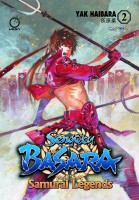 Sengoku Basara: Samurai Legends, Omnibus 2 (equivalent to Volumes 3-4) by Yak Haibara. I get a huge kick out of the Sengoku Basara: Samurai Legends manga. I’ve never played Sengoku Basara 2—the video game on which it is directly based (it hasn’t been released in North America)—nor have I seen any of the Sengoku Basara anime (though I may make a point to check it out now), but I do have some familiarity with the Warring States period. Because of the number of characters, battles, alliances, castles and such to keep track of in Samurai Legends, which are all based on historical figures and events, that familiarity has come in handy. Overall, I think the first omnibus of Samurai Legends was a little stronger than the second omnibus. The last half of the series has a few continuity problems in the artwork, and there are some characters who are introduced more because they are a part of the franchise than because they had an important role to play in the manga, but it was still a lot of fun. I really enjoy the series’ over-the-top fights, characters, and dialogue.
Sengoku Basara: Samurai Legends, Omnibus 2 (equivalent to Volumes 3-4) by Yak Haibara. I get a huge kick out of the Sengoku Basara: Samurai Legends manga. I’ve never played Sengoku Basara 2—the video game on which it is directly based (it hasn’t been released in North America)—nor have I seen any of the Sengoku Basara anime (though I may make a point to check it out now), but I do have some familiarity with the Warring States period. Because of the number of characters, battles, alliances, castles and such to keep track of in Samurai Legends, which are all based on historical figures and events, that familiarity has come in handy. Overall, I think the first omnibus of Samurai Legends was a little stronger than the second omnibus. The last half of the series has a few continuity problems in the artwork, and there are some characters who are introduced more because they are a part of the franchise than because they had an important role to play in the manga, but it was still a lot of fun. I really enjoy the series’ over-the-top fights, characters, and dialogue.
 Sickness Unto Death, Volume 2 written by Hikari Asada and illustrated by Takahiro Seguchi. Probably because it doesn’t employ nearly as many clichés, the second volume of Sickness Unto Death is much better than the first. Granted, the first volume was needed to set it up the whole scenario; I just think it could have been handled better. But the payoff is mostly satisfying. Even so, the manga still makes me vaguely uncomfortable, and not in the way I think it was intended to. The problem I have with the story of Sickness Unto Death stems from the way Emiru’s case is handled. That Kazuma wants to help and treat her I’m fine with. In fact, there’s some really interesting conflicts of interest and ethical and philosophical questions that arise because of it. At its best, Sickness Unto Death has some marvelously dark psychological elements to it. What particularly bothers me about the series is that Kazuma’s continued “treatment” of Emiru is actually encouraged by his professor, which is highly irresponsible not to mention unprofessional.
Sickness Unto Death, Volume 2 written by Hikari Asada and illustrated by Takahiro Seguchi. Probably because it doesn’t employ nearly as many clichés, the second volume of Sickness Unto Death is much better than the first. Granted, the first volume was needed to set it up the whole scenario; I just think it could have been handled better. But the payoff is mostly satisfying. Even so, the manga still makes me vaguely uncomfortable, and not in the way I think it was intended to. The problem I have with the story of Sickness Unto Death stems from the way Emiru’s case is handled. That Kazuma wants to help and treat her I’m fine with. In fact, there’s some really interesting conflicts of interest and ethical and philosophical questions that arise because of it. At its best, Sickness Unto Death has some marvelously dark psychological elements to it. What particularly bothers me about the series is that Kazuma’s continued “treatment” of Emiru is actually encouraged by his professor, which is highly irresponsible not to mention unprofessional.

